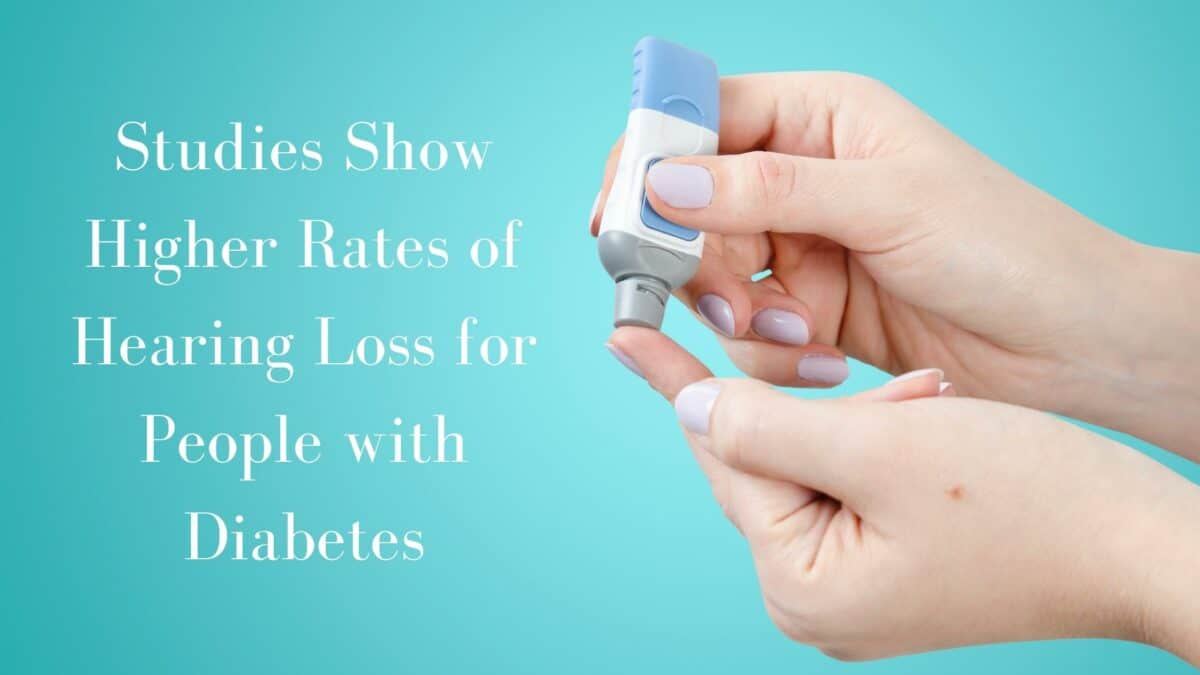Over 34 million people have diabetes in the United States. According to the American Diabetes Association, 1.5 people are diagnosed with diabetes every year. Diabetes can impact health in a myriad of ways, including contributing to hearing loss. Studies show that people with diabetes can be twice as likely to develop hearing loss compared to those without diabetes. Hearing loss not only reduces one’s capacity to hear and process sound, but it often strains communication and has multifaceted effects on health. Implementing ways to protect hearing health if you have diabetes or are prediabetic is an important way to be preventative and protective.
Link Between Hearing Loss & Diabetes
Several studies explore the link between diabetes and hearing loss. Research shows that there is a significant correlation between both conditions. This includes a study published in the Annals of Internal Medicine that investigated the relationship between both conditions. Conducted by researchers at the National Institutes of Health, this study included over 5,000 participants with and without diabetes. Researchers collected and analyzed data that included results from hearing tests as well as information provided from a diabetes questionnaire. Key findings include that adults with diabetes:
- 21% experienced a mild or greater hearing loss of low or mid-frequency sounds compared to 9% of adults without diabetes.
- 54% experienced a mild or greater hearing loss of high-frequency sounds compared to 32% of adults without diabetes.
- Adults with prediabetes had a 30% higher rate of hearing loss
These findings reveal that diabetes can significantly increase one’s risk of developing hearing loss. “Hearing loss may be an under-recognized complication of diabetes. As diabetes becomes more common, the disease may become a more significant contributor to hearing loss,” said Catherine Cowie, Ph.D. who is senior author of the study. You may be curious about how exactly diabetes affects the auditory system.
Impact of Diabetes on Hearing Health
Diabetes is a chronic medical condition that involves how the body converts food into energy. Food is broken down into sugar (glucose) and released into the bloodstream. The pancreas releases insulin when blood sugar increases to have the body’s cells absorb and use it as energy. Diabetes is characterized by the body not producing enough insulin or the insulin that it releases is not being used adequately.
High levels of glucose that remain in the bloodstream can damage blood vessels and nerves in the body, including in the inner ear. The inner ear is filled with hair cells and fluid that play an integral role in how we hear. These sensory cells help convert sound waves into electrical signals. These signals are then carried, by the auditory nerve, to the brain where they are further processed. The brain assigns meaning to the sound which is what allows us to understand what we hear. Damaged hair cells and/or nerves in the inner ear can disrupt this process, resulting in a reduced capacity to hear. This consistent link between hearing loss and diabetes underscores the importance of having your hearing assessed if you have diabetes or are prediabetic.
Protecting Hearing Health
There are several safety measures you can integrate to reduce your risk of developing hearing loss. This includes:
- Have hearing tests regularly. Hearing tests involve a painless process that measures hearing capacity in both ears. This identifies any impairment and the degree of impairment. Hearing tests establish a baseline of your hearing health and needs. If hearing loss is present, your healthcare provider can recommend treatment that can transform your hearing.
- Prioritize care for diabetes. Be sure to take all necessary medications, precautions, and doctor-recommended regimens to ensure your diabetes is effectively managed.
- Reduce exposure to loud noise. One-time or consistent exposure to loud noise is a major cause of hearing loss. Reduce your exposure by maintaining lower volume settings on electronic devices, taking listening breaks, and wearing hearing protection. This can include earmuffs, earplugs, and headphones which offer a protective barrier for the ears.
These safety tips can protect your hearing health from impairment. Being as preventative as possible, especially if you have diabetes, is important for overall health and wellness. Contact us today to schedule an appointment for a hearing consultation.

